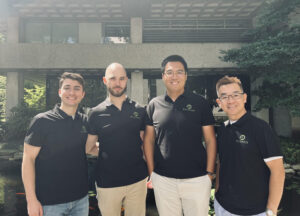Using Spark Fund Award to Revolutionize Cooling Technology
MIE Associate Professor Yi Zheng is using the Spark Funds he received earlier this year to develop and commercialize more practical passive cooling products to combat the negative effects of climate change and reduce greenhouse gas emissions.
Planck Energies is Revolutionizing Cooling Technology with Passive-Cooling Paint — with Spark Fund Awardee Professor Yi Zheng
 Compressor-based cooling systems, such as air conditioners for homes and commercial buildings, are a significant contributor to greenhouse gas emissions. As of 2020, these systems account for approximately 20% of total worldwide electricity consumption. The resulting greenhouse gas emissions expelled into the environment intensify global warming and accelerate climate change. Addressing this urgent challenge requires innovative, sustainable solutions, such as passive radiative cooling technologies, which provide passive cooling effects without energy consumption. However, many of the existing passive cooling materials are largely impractical, due to complicated and expensive fabrication processes and inefficiencies due to surface contamination.
Compressor-based cooling systems, such as air conditioners for homes and commercial buildings, are a significant contributor to greenhouse gas emissions. As of 2020, these systems account for approximately 20% of total worldwide electricity consumption. The resulting greenhouse gas emissions expelled into the environment intensify global warming and accelerate climate change. Addressing this urgent challenge requires innovative, sustainable solutions, such as passive radiative cooling technologies, which provide passive cooling effects without energy consumption. However, many of the existing passive cooling materials are largely impractical, due to complicated and expensive fabrication processes and inefficiencies due to surface contamination.
That’s why Professor Yi Zheng, his research lab, and his startup, Planck Energies, are working to develop and commercialize more practical passive cooling products to combat the negative effects of climate change and reduce greenhouse gas emissions.
This work has earned them selection as one of the Fall 2023 Spark Fund awardees.
A Novel Approach: Tech
Zheng and the Planck Energies team were previously awarded Spark Fund funding for an earlier iteration of their passive cooling material. The Spring 2021 award was given for their work developing a recyclable, scalable, and self-cleaning passive cooling paper for building. Through this funding, they discovered concerns about the long-term durability, large-scale manufacturability potential, and application method of the paper material.
“Some concepts are innovative, but only in theory, while some have great potential to yield cost-effective and functional products to combat global warming,” says Zheng.
So, with their relentless focus on climate change, greenhouse gas reduction, and water conservation, Planck Energies shifted its focus from paper materials to dispersible bio-pigments. This strategic move reflects their commitment to innovation, scalability, and sustainability in passive cooling technology.
The team is now crafting a highly reflective, ultra-white passive cooling paint designed for roofs and surfaces. This innovative paint offers a game-changing solution for keeping buildings cooler while reducing the demand on traditional air conditioning systems. Zheng emphasizes, “Cooling systems are one of the largest contributors to electricity use. Reducing this need via passive technologies represents an important step toward sustainability.”
Furthermore, this technology can offer cooling solutions to less industrialized communities or communities without reliable access to air conditioning. A/C may not be viable in many areas due to monetary, developmental, or other factors. This lack of reliable cooling technology represents a great risk to human well-being, especially as more extreme heat waves are on the rise.
Zheng recognizes the importance of such applications, stating, “Cool roof technology is extremely well suited to these scenarios due to its low cost and off-grid capability, so we are very driven to apply it in these environments.”
In discussions with other industries, the team has discovered their material may also have many other applications, such as in medical devices, personal care products, and the polymer processing industry. This versatility showcases the potential wide-reaching impact of their materials beyond the passive cooling space they’ve initially targeted.
The team has recently secured an SBIR Phase 1 grant from NSF of 275k to further assist Planck Energies in reaching commercialization. The team was also awarded a previous Spark Fund and MassVentures Acorn Innovation Award, which supported an earlier stage of the project.
Commercialization with the Spark Fund
Looking ahead, Zheng and Planck Energies envision their proprietary material as a standard additive in various cooling paint products and be in-use as a space cooling feature on buildings. Licensing agreements with manufacturers of paint and coatings could pave the way for a global shift from traditional A/C systems. There is immense potential to provide an electricity-free cooling solution for developing regions, particularly in the global south. The Spark Fund Award given by Northeastern’s CRI will support the team as they continue their R&D efforts toward commercialization.
“The Spark Fund Award will support our efforts to study our materials’ interactions with materials commonly used in paint production,” says Zheng. “It will also help fund our researchers and enable equipment and material procurement.”
With their pioneering work, Zheng and Planck Energies offer a glimpse into a future where eco-friendly, energy-efficient cooling is not only possible but widely accessible. As we face the urgent challenges of climate change, their efforts represent a beacon of hope for a more sustainable world.
Read about the previous stage of their research and learn more about Professor Zheng’s research and the five other 2023 Fall Spark Award grantees.
Written by Elizabeth Creason, Center for Research Innovation